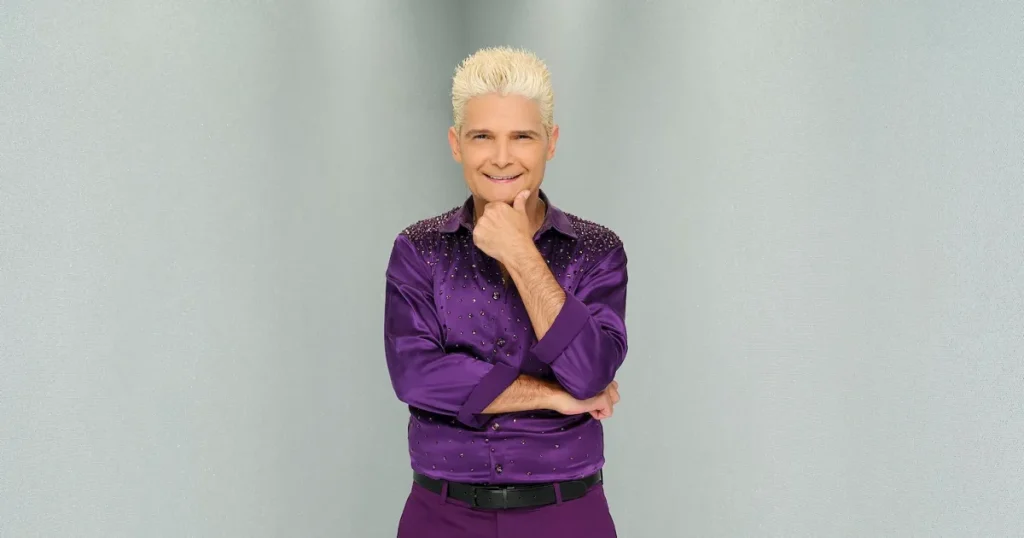Corey Feldman’s Mixed Experience with Dancing With the Stars
Corey Feldman recently made a brief return to the Dancing With the Stars ballroom for the season 34 finale preparations, sharing his excitement on Instagram despite previously making controversial claims about the show’s environment. The 54-year-old actor expressed genuine joy at reuniting with the cast and crew, particularly his former dance partner Jenna Johnson and fellow early-eliminated contestant Baron Davis. Feldman’s enthusiastic post highlighted how much he enjoyed being back in the DWTS world, mentioning that both he and Davis wished they’d had more time to showcase their talents on the competition. He playfully teased that viewers might catch glimpses of him “moon walking” or spinning across the screen during the upcoming finale, encouraging fans to enjoy the show while hinting he has predictions about the eventual winner that have so far proven accurate.
While Feldman appeared to be enjoying his return to the DWTS community, his experience on the show has been complicated by allegations he made about the behind-the-scenes environment. In a preview for an upcoming episode of Guvery’s Law radio show, Feldman described the backstage culture as “toxic,” claiming there was significant “mudslinging” happening out of view of cameras. He drew a stark contrast between the on-set experience, which he characterized as harmonious and productive, and what he perceived as dramatic interpersonal conflicts brewing behind the scenes. His comments reflected frustration with media reports and gossip that circulated during his time on the show, particularly claims about him being difficult to work with or being an “egomaniac.” Feldman’s candid assessment painted a picture of a show where the public-facing elements mask more complicated dynamics among those involved in production.
One particularly noteworthy element of Feldman’s claims involved professional dancer Maksim Chmerkovskiy, who is the brother-in-law of Jenna Johnson, Feldman’s dance partner. During the September airing of the season, Maksim had publicly stated that Johnson was having a “difficult time” working with Feldman – a comment that clearly bothered the actor. In his radio interview, Feldman recounted confronting Johnson about these remarks, claiming she dismissed them by saying, “Oh it’s just Maks. Don’t pay attention to him. He just wants attention.” This interaction highlights the complex web of relationships and public commentary surrounding reality competition shows, where family connections between cast members and external commentary can create additional pressures for contestants. The tension between Feldman’s experience with Johnson and the public narrative being shaped by those adjacent to the show appears to have contributed significantly to his frustrations.
Following the attention his “toxic” comments received, Feldman quickly moved to clarify his statements in a carefully worded statement to People magazine. His clarification drew an important distinction, emphasizing that his criticisms were not directed at the show itself or its immediate participants, but rather at “outside commentary, rumors and individuals who are no longer directly involved with DWTS but still feel entitled to weigh in and create unnecessary drama.” This refinement of his criticism appeared aimed at maintaining positive relationships with the production team and current cast while still acknowledging the difficulties he experienced. Feldman stressed that everyone directly associated with the show had treated him with “kindness, support and respect,” suggesting his issues stemmed primarily from external forces rather than the core DWTS community. His clarification demonstrated an awareness of how his comments might affect his relationship with the production, particularly as he prepared to return for the finale.
Despite the controversy surrounding his comments, Feldman’s statement to People expressed continued enthusiasm for the show and gratitude for the opportunity to participate. He specifically mentioned looking forward to rehearsals and dancing with Jenna Johnson again, suggesting that whatever tensions might have existed had not permanently damaged their professional relationship. His reference to the “DWTS family” being “wonderful” reinforced his attempt to separate his criticisms from the show’s immediate community, positioning himself as appreciative of the core experience despite the challenges he faced. This careful navigation of public criticism while maintaining professional relationships illustrates the delicate balance contestants must maintain when participating in high-profile reality competitions, where public perception and behind-the-scenes realities don’t always align.
The Dancing With the Stars season 34 finale, set to air on ABC and Disney+ on November 25th, will likely feature Feldman in some capacity, bringing his complicated journey with the show to a conclusion. His experience highlights broader questions about reality television environments, the impact of social media and press coverage on contestants’ experiences, and the sometimes blurry line between the performance viewers see and the reality experienced by participants. For fans of the show, Feldman’s story offers a glimpse into the challenges that can exist behind the glamour and spectacle of competitive dance television. While his criticisms suggest room for improvement in how the broader DWTS ecosystem functions, his continued participation and expressions of gratitude indicate that he ultimately found value in the experience despite its complications.


